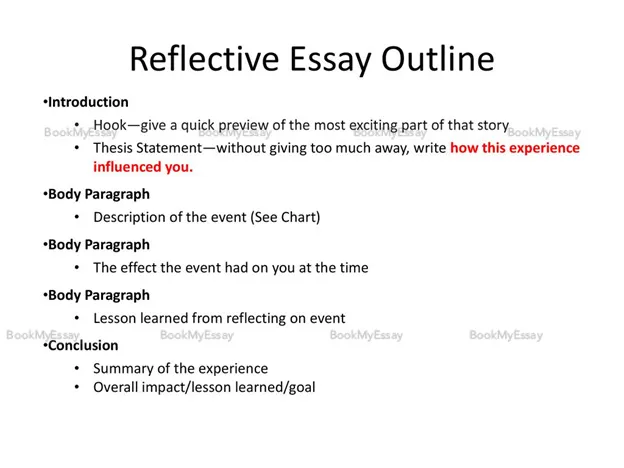How To Write A Reflective Essay
To write a reflective essay effectively, follow these key steps. First, select a meaningful topic or experience that you can reflect upon deeply. This could be a personal journey, a significant event, or a challenging situation. Next, brainstorm your thoughts and emotions about the topic, considering how it has impacted you and what lessons you've learned.
After brainstorming, create an outline to organize your essay's structure. Typically, a reflective essay includes an introduction with a thesis statement, body paragraphs that explore different aspects of your reflection, and a conclusion that summarizes your insights and experiences.
When writing your essay, be honest and introspective, sharing your genuine thoughts and feelings. Use descriptive language to paint a vivid picture for your readers. Additionally, reflect on what you've learned from the experience and how it has influenced your personal growth or perspective.
Finally, revise and edit your essay to ensure clarity, coherence, and grammar correctness. Consider seeking feedback from peers or utilizing a cheap essay writer service for professional assistance and guidance in refining your reflective essay.
What Are The Key Components Of A Reflective Essay?
A reflective essay, whether crafted as a custom essay or for a college application, comprises several key components that enrich its depth and impact. Firstly, a strong introduction sets the stage by outlining the topic and context, often incorporating a hook to engage the reader's interest. This section also includes a thesis statement that encapsulates the main point or experience being reflected upon.
The body of the essay delves into the reflection process, presenting personal experiences, observations, and insights. This part should be structured logically, with each paragraph focusing on a specific aspect or event and providing supporting details or examples. Critical analysis and self-assessment are essential components here, demonstrating the writer's ability to evaluate their experiences and learning.
Moreover, a reflective essay includes a conclusion that summarizes the key points discussed and emphasizes the significance of the reflection. It may also suggest future actions or lessons learned. Overall, these components work together to create a compelling narrative that showcases the writer's introspection and growth.

How Can Personal Experiences Be Effectively Incorporated Into Reflection?
In college essay writing help and academic assignments, incorporating personal experiences into reflections requires a delicate balance between introspection and critical analysis. The process begins with identifying relevant personal experiences that connect with the topic or theme under consideration. This could involve recalling a significant event, a challenging situation, or a moment of personal growth.
Once the experience is identified, it's crucial to delve into the details, emotions, and lessons learned. This depth adds authenticity and substance to the reflection. However, merely recounting events is insufficient; it's equally important to analyze how these experiences shaped one's beliefs, perspectives, and actions.
A skilled assignment provider knows how to guide students in weaving personal experiences seamlessly into their reflections. This involves structuring the reflection to include introspective questions, critical analysis, and meaningful insights. By doing so, students can create compelling narratives that not only showcase their personal journey but also demonstrate their ability to reflect, learn, and grow from their experiences.
What Strategies Aid In Organizing Thoughts For A Reflective Essay?
When it comes to organizing thoughts for a reflective essay, several strategies can significantly enhance the clarity and coherence of your writing. Firstly, conducting thorough brainstorming sessions can help generate ideas and themes relevant to your reflective piece. This process involves jotting down key points, personal experiences, and emotions related to the topic. Secondly, creating an outline serves as a roadmap for structuring your essay. Divide your thoughts into introduction, body paragraphs discussing different aspects of your reflection, and a conclusion summarizing your insights.
Additionally, employing the P.E.E.L. (Point, Evidence, Explanation, Link) method can lend a structured approach to each paragraph. Start with a clear point, provide evidence from your experiences or literature, explain the significance or impact, and link it back to your main thesis. Another helpful strategy is to use transition words and phrases to ensure smooth transitions between paragraphs and ideas.
For Assignment Assistance in Academic Writing, these strategies can be invaluable in crafting well-organized and thoughtful reflective essays.
Why Should Students Use BookMyEssay For Assignment Help?
When considering where to seek assignment help, students should prioritize reliability and quality. BookMyEssay stands out as an excellent choice for several reasons.
Firstly, students should consider how to select the most reliable essay writing service. BookMyEssay maintains its reputation by hiring experienced writers with expertise in various subjects. These writers deliver high-quality, well-researched assignments tailored to meet specific academic requirements.
Additionally, BookMyEssay ensures timely delivery, giving students peace of mind and allowing them to meet deadlines effectively. Their customer support is also commendable, providing assistance and clarifications promptly.
Moreover, BookMyEssay offers competitive pricing with transparent policies, ensuring students get value for their money. The platform also prioritizes confidentiality, protecting students' identities and ensuring their work remains private.
Overall, students benefit significantly from using BookMyEssay for assignment help due to its reliability, quality, timely delivery, competitive pricing, and confidentiality. These factors make it a trusted and recommended choice among students seeking academic assistance.







 3 Bellbridge Dr, Hoppers Crossing, Melbourne VIC 3029
3 Bellbridge Dr, Hoppers Crossing, Melbourne VIC 3029




